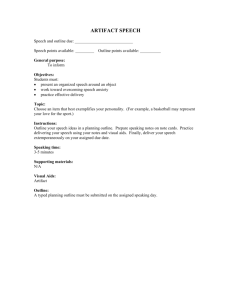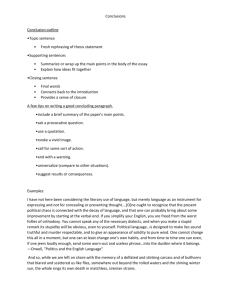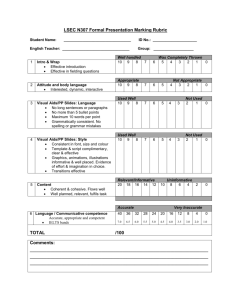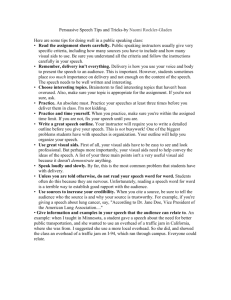THE OFFICE OF ACADEMIC SUCCESS PROGRAMS (OASP)
advertisement
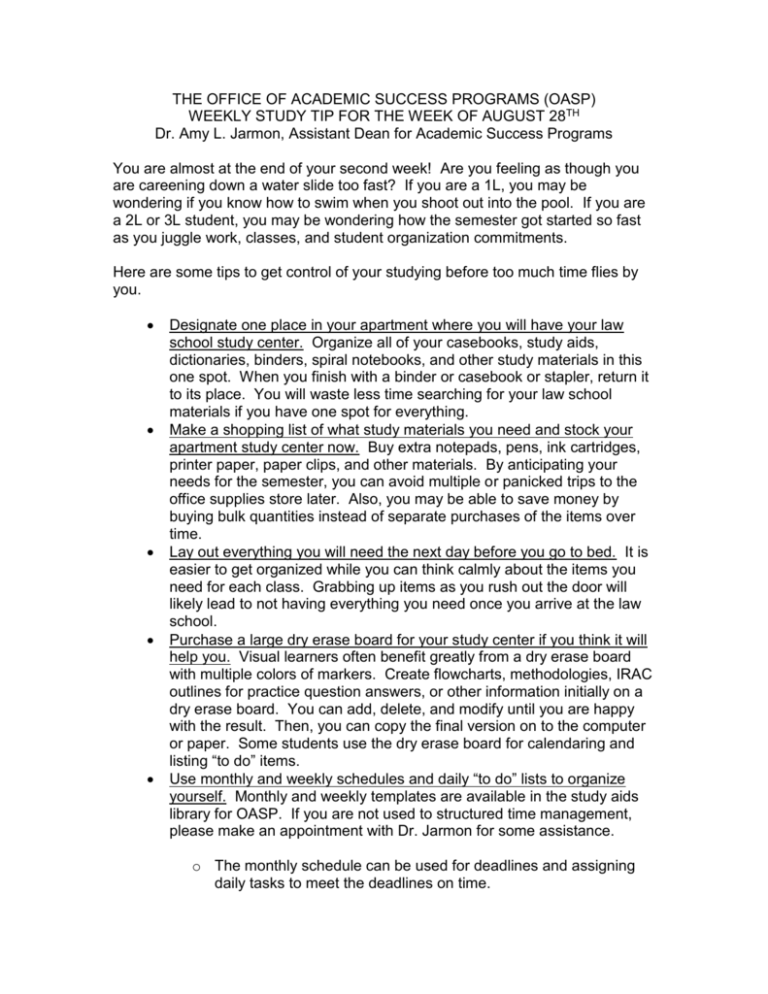
THE OFFICE OF ACADEMIC SUCCESS PROGRAMS (OASP) WEEKLY STUDY TIP FOR THE WEEK OF AUGUST 28TH Dr. Amy L. Jarmon, Assistant Dean for Academic Success Programs You are almost at the end of your second week! Are you feeling as though you are careening down a water slide too fast? If you are a 1L, you may be wondering if you know how to swim when you shoot out into the pool. If you are a 2L or 3L student, you may be wondering how the semester got started so fast as you juggle work, classes, and student organization commitments. Here are some tips to get control of your studying before too much time flies by you. Designate one place in your apartment where you will have your law school study center. Organize all of your casebooks, study aids, dictionaries, binders, spiral notebooks, and other study materials in this one spot. When you finish with a binder or casebook or stapler, return it to its place. You will waste less time searching for your law school materials if you have one spot for everything. Make a shopping list of what study materials you need and stock your apartment study center now. Buy extra notepads, pens, ink cartridges, printer paper, paper clips, and other materials. By anticipating your needs for the semester, you can avoid multiple or panicked trips to the office supplies store later. Also, you may be able to save money by buying bulk quantities instead of separate purchases of the items over time. Lay out everything you will need the next day before you go to bed. It is easier to get organized while you can think calmly about the items you need for each class. Grabbing up items as you rush out the door will likely lead to not having everything you need once you arrive at the law school. Purchase a large dry erase board for your study center if you think it will help you. Visual learners often benefit greatly from a dry erase board with multiple colors of markers. Create flowcharts, methodologies, IRAC outlines for practice question answers, or other information initially on a dry erase board. You can add, delete, and modify until you are happy with the result. Then, you can copy the final version on to the computer or paper. Some students use the dry erase board for calendaring and listing “to do” items. Use monthly and weekly schedules and daily “to do” lists to organize yourself. Monthly and weekly templates are available in the study aids library for OASP. If you are not used to structured time management, please make an appointment with Dr. Jarmon for some assistance. o The monthly schedule can be used for deadlines and assigning daily tasks to meet the deadlines on time. o The weekly schedule can be used to design a study schedule that can be repeated most weeks to make certain you are getting all study tasks done each week. o “To do” lists can be used to prioritize the most important tasks each day. Become aware of what study techniques other students are using that you may want to adopt. If a classmate seems to be really organized, ask for some pointers on how she organizes her notes, briefs, outlines, etc. If another classmate has a natural talent for making flowcharts to depict complex ideas, ask for pointers on how to make effective charts. If someone else has helpful templates for briefing on her computer, ask if she will share how she set them up. Evaluate what did and did not work previously. If you are an advanced law student, evaluate study strategies that have been successful in law school previously – continue those strategies. Evaluate also what did not work well for you. Decide how to improve and modify or jettison those ineffective strategies. If you are a 1L, consider strategies that worked well in undergraduate or graduate school AND determine whether they are being effective for you in law school. If strategies are not translating well to law school, seek help from Dr. Jarmon or your tutors or professors. Use the “open door” policy to advantage. Regularly go to see your professors with questions that you have about the course. Do not wait for weeks to clear up confusion. Once you have made a good faith effort to resolve your confusion, go to the professor if you are still unclear. o Make a list of the specific questions that you have so that you do not forget to ask anything. o If appropriate to the area of confusion, take your class notes, briefs, outlines, casebooks or other materials with you so that you can show your professor exact problems. For example, it is easier for a professor to help you with phrasing correct issue statements is she can look at several issue statements in your briefs to understand why you keep getting your issue statements wrong. o Ask your professor for tips on studying for her specific course if you are feeling lost about what to do. o Be courteous. Remember you are in a professional school and need to act professionally in all interactions: e-mail; phone; or inperson appointments. Use study aids wisely for each course. Do not buy every study aid that is available for a subject. You will not have time to read all of them. Some of them may not suit your learning styles. Some may not match your professor’s version of the course or your casebook. There is a handout in the OASP study aids library on being a wise consumer of study aids. o Initially choose a maximum of one commentary on what the law is and one practice question book for each course. o You can “test drive” study aids through the OASP library (and to certain extent through the law library) before deciding to purchase the study aid. o If your professor recommends a study aid, buy it AND actually use it. o Ask law students who have had the professor and course before what study aids they recommend. o Schedule time to use the study aids in your weekly schedule. Take advantage of “windfall” time. Keep flashcards in your backpack to use when the bus or your ride is late, your study buddy is delayed, or you finish some task earlier than you expected. Other tasks that often fit into short time periods: make a “to do” list for the next day; review your class notes; study a small chunk of your outline; do several multiple-choice questions in a practice book or on CALI. Plan non-law-school tasks to allow you to be efficient and effective in your use of time. o FOOD: Cook nutritious meals in the crock-pot on the weekends and freeze or refrigerate individual portions for later use during the week. Prepare food items in quantity over the weekend so that you just have to dish out food during the week: cut up mixed fruit; cut up carrot and celery sticks; wash salad greens; make multiple sandwiches to freeze and pull out to thaw later. o ERRANDS: Plan your errands to save miles and gas. Have your vendors close to school or work or where you live so that all errands will be close together. Schedule specific errand times for when you are less likely to study: at the end of a long day of classes; as a break between several intensive study periods; on the way home. o GROCERIES: Consider whether shopping for non-perishable staples once a month will save you time and money with bulk buys. Shop at the times of day when the store is less crowded. Find out when produce and other items are delivered to your store so that you shop on the day when items are the most fresh. o LAUNDRY: Decide what study tasks can be done while you wait for the washer and dryer. If you use a laundromat or apartment complex laundry room, have a zip-lock bag near your laundry supplies that has pens, highlighters, and other paraphernalia that you will need for studying in that location.

